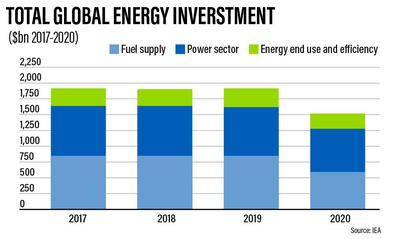Global investment in energy is expected to slump 20 per cent or nearly $400 billion (Dh1.47bn) in 2020 due to the “staggering” impact of the Covid-19 pandemic on the industry, according to the International Energy Agency.
Energy investment was on track for a 2 per cent rise – the largest increase in spending in six years, but has been derailed by the pandemic, which disrupted global supply chains and led to a sharp drop in energy consumption.
“The historic plunge in global energy investment is deeply troubling for many reasons,” said IEA executive director Fatih Birol.
"It means lost jobs and economic opportunities today, as well as lost energy supply that we might well need tomorrow once the economy recovers. The slowdown in spending on key clean energy technologies also risks undermining the much-needed transition to more resilient and sustainable energy systems," he said at the launch of the agency's World Energy Investment 2020 report.
Revenue to state coffers could decline by well over $1 trillion globally this year from falling demand for energy and lower prices, notably for oil, as well as a rise in non-payment of bills.
Oil accounts for much of the decline, the Paris-based agency said, singling out the fact that global consumer spending on the commodity is set to fall below the amount spent on electricity for the first time. Of the $1.52tn set to be spent on energy this year – down from $1.89tn last year – $575bn will be spent on the fuel sector and $678bn on power.
Weak balance sheets of energy companies, as well as uncertain demand outlooks, will see projects being cut back and budgets being squeezed as a result of “lockdowns and disrupted supply chains”, the report said.
Higher debt, as a result of companies seeking state and other sources of funding, will leave a “longer-term” post-crisis legacy, presenting lasting risks to investment, the agency said.
Investment in the oil and gas sector globally is expected to decline by about a third in 2020, with investment in shale, which has been hit hard by the slump in prices, is set to fall by 50 per cent. Oil prices declined by 60 per cent in April from their peak in January. A lack of investment could have an impact on supply, with many oil producers becoming cash-strapped as a result of declining revenue.
"For oil markets, if investment stays at 2020 levels then this would reduce the previously-expected level of supply in 2025 by almost 9 million barrels a day, creating a clear risk of tighter markets if demand starts to move back towards its pre-crisis trajectory,” the report said.
Spending on the power sector is also set to decline by 10 per cent this year, with “worrying signals” for more sustainable sources of electricity. The renewable energy industry has weathered the pandemic in a more resilient way than fossil fuels, said the IEA. However, the agency noted that spending on rooftop solar installations by households and businesses was strongly affected. Final investment decisions for new utility-scale wind and solar schemes for the first quarter of 2020 fell back to levels seen three years ago, according to the report.
Investment in electricity networks is set to decline 9 per cent compounding an already large fall in 2019, with spending on sources of power system flexibility, natural gas and battery storage levelling off.
“Electricity grids have been a vital underpinning of the emergency response to the health crisis – and of economic and social activities that have been able to continue under lockdown,” said Mr Birol.
“These networks have to be resilient and smart to ward against future shocks but also to accommodate rising shares of wind and solar power. Today’s investment trends are clear warning signs for future electricity security,” he added.



